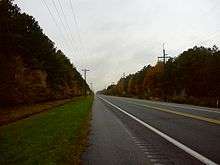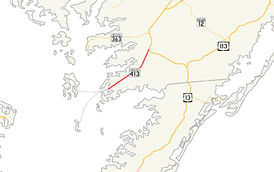Maryland Route 413
| ||||
|---|---|---|---|---|
|
Maryland Route 413 highlighted in red | ||||
| Route information | ||||
| Maintained by MDSHA | ||||
| Length: | 14.61 mi[1] (23.51 km) | |||
| Existed: | 1927 – present | |||
| Tourist routes: |
| |||
| Major junctions | ||||
| South end: | Dead end in Crisfield | |||
|
| ||||
| North end: |
| |||
| Location | ||||
| Counties: | Somerset | |||
| Highway system | ||||
| ||||
Maryland Route 413 (also known as MD 413 or Route 413) is a 14.61-mile (23.51 km) state highway in Somerset County in the U.S. state of Maryland. The route runs from a dead end at Crisfield's city dock, which is located on the Tangier Sound, northeast to U.S. Route 13 (US 13) in Westover. It is the main highway leading into Crisfield, and is known as Crisfield Highway for much of its length. The highway travels through mostly rural areas of farms and woods as well as the communities of Hopewell, Marion Station, and Kingston. It is a two-lane undivided road for most of its length; a portion of the road in Crisfield is a four-lane road that follows a one-way pair. MD 413 is part of two scenic routes: Blue Crab Scenic Byway and the Beach to Bay Indian Trail, both are Maryland Scenic Byways.
The Crisfield–Westover Road was one of the original state roads marked for improvement by the Maryland State Roads Commission. The highway was paved in the 1910s and designated MD 413 in 1927. MD 413 was relocated starting in the late 1930s to a new alignment parallel to the Eastern Shore Railroad line that made Crisfield the "Seafood Capital of the World." The relocation began in Crisfield and was completed to Westover in 1950. The old alignment of MD 413 was designated MD 667. The state highway was expanded to a divided highway in the mid-1950s in Crisfield. The railroad track was abandoned in 1976 and later removed, but traces of the railroad remain along MD 413's modern alignment.
Route description

MD 413 begins at the city dock on the waterfront in Crisfield at the intersection with Dock Street, heading to the northeast.[1][2] It begins on a four-lane boulevard with a median, and is known as West Main Street, fronting local businesses in the downtown area.[1] After Seventh Street, Main Street leaves MD 413, and the boulevard's two carriageways become known as Richardson Avenue northbound and Maryland Avenue southbound.[1] At this point the road begins to front mostly homes on Maryland Avenue, while on Richardson Avenue it runs past and homes and businesses, such as gas stations and restaurants. On a gentle curve, Chesapeake Avenue intersects the northbound carriageway, providing access to the southern beginning of MD 667.[2]
Before leaving the city, the route intersects MD 460, also known as Hall Highway, immediately accessible only from the southbound carriageway.[1] MD 460 provides a direct link to McCready Memorial Hospital. Access to that route from northbound MD 413 is given by Wynfall Avenue, which the road intersects farther south.[2] Very soon after, it intersects MD 358 (Jacksonville Road), which heads north, and Somerset Avenue, which heads south.[1][2] Past the MD 358 intersection, the road narrows to two travel lanes with the median becoming a left turn lane as many businesses and side streets front the road. The route becomes the Crisfield Highway, which it is known as for the remainder of its journey. After intersecting Silver Lane, the left turn lane closes, and MD 413 becomes a rural, two-lane highway with full shoulders, exiting Crisfield's corporate limits just north of the Sherwin–Williams (former Rubberset) entrance and continuing past the old site of Carvel Hall Cutlery.[1][2]
Upon leaving Crisfield, MD 413 passes through a mix of woodland and farmland. In Hopewell, MD 667 intersects the highway, and after clearing some modest wooded development up to and slightly beyond the Holland Crossing Road intersection, the route enters heavy woodland. It passes a man-made pond before intersecting MD 667 again.[1][2] Both routes parallel each other on the way into the community of Marion Station, straddling the old railroad bed. Both routes are intersected by Davis Road and Tulls Corner Road/Charles Cannon Road, after which MD 667 turns almost due east, with MD 413 heading through a small neighborhood outside the center of Marion.[2]

Past Marion, the route resumes northeast through woods and farms with some residences along the route.[2] Approaching Kingston, MD 413 intersects Lovers Lane.[1][2] After this, a long curve to the north-northeast begins, which ends just south of Kingston Lane and the center of Kingston.[1] Beyond Kingston, the route crosses the Big Annemessex River and travels past a tree farm. After passing through a forest, two side roads lead to the Somerset County Health Department and the Somerset Intermediate School, with the pavement's striping reconfigured to accommodate left turns at the two close intersections.[2]
As the road nears Westover, it passes by the Great Hope Golf Course and shortly after intersects MD 361 (Fairmount Road).[1][2] Here, the road meets Old Westover-Marion Road, a former routing of the highway.[1] Passing through the development of Westover, MD 413 intersects MD 673 (Sam Barnes Road), a short connector route to US 13 southbound to Pocomoke City. From US 13 northbound, MD 673 serves as the connection to MD 413 southbound. Past MD 673, the highway passes through farmland. MD 413 heads through some woods and crosses the Back Creek of the Manokin River before coming to end at an intersection with US 13.[1][2]
MD 413 is part of the Blue Crab Scenic Byway, which consists of various roads in the lower Eastern Shore of Maryland.[3] It is also part of the Beach to Bay Indian Trail, a Maryland Scenic Byway that connects Ocean City on the Atlantic Ocean to Smith Island in the Chesapeake Bay and is noted by signs along the route.[4][5]
History
Crisfield grew to prominence as the "Seafood Capital of the World" and became the second largest city in Maryland by 1904 thanks to an extension of the Eastern Shore Railroad to the city in 1866 instigated by the city's namesake, John W. Crisfield.[6][7] The city's importance led to the Crisfield–Westover Road being designated one of the original state roads nominated for improvement by the Maryland State Roads Commission in 1909.[8] The state road was paved from the eastern city limits of Crisfield (the present western terminus of MD 667) to Hopewell and from Westover to Kingston in 1913. The segment between Kingston and Marion was completed in 1915.[9] The state road was completed when the final section was completed between Hopewell and Marion by 1920.[8] MD 413 received its number in the original assignment of state route numbers in 1927.[10] Within the city of Crisfield, Maryland Avenue was constructed between Main Street and Somerset Avenue, Chesapeake Avenue was brought into the state highway system within the city limits, and Main Street was improved and brought into the state highway system between the city pier and Maryland Avenue around 1935.[11][12]

Starting in the mid-1930s, MD 413 was relocated to an alignment paralleling the Crisfield Secondary Branch of the Pennsylvania Railroad. The first portion of MD 413 was relocated in 1935 in conjunction with the relocation of US 13 between Princess Anne and Westover. MD 413 was moved from Sam Barnes Road and Sign Post Road to its present alignment between US 13 and Old Westover–Marion Road in Westover.[11][12] The first section of the present straight highway between Crisfield and Westover was constructed in 1938 and 1939 from the eastern city limits of Crisfield (near the intersection with MD 358) to Hopewell.[13][14] The bypassed portion of MD 413 and subsequent bypassed segments were designated MD 667.[14] The section of the new alignment between Hopewell and Marion was completed in 1942.[15][16] The Marion–Westover portion of the realignment was completed in 1950.[17][18]
MD 413 was expanded to a four-lane divided highway between the city pier and the eastern city limits of Crisfield in 1956.[19] Between the city pier and Maryland Avenue, the divided highway replaced the path of the railroad; the railroad's terminus was moved to a new pier to the north.[20][21] North of the Main Street portion of the divided highway, the railroad track separated the two directions of MD 413: Maryland Avenue formed the northbound lanes while Richardson Avenue was brought into the state highway system to comprise the southbound lanes. The two directions of MD 413 were divided by an operating railroad track until the Crisfield Secondary Branch was abandoned with the formation of Conrail in 1976.[22]
Junction list
The entire route is in Somerset County.
| Location | mi[1] | km | Destinations | Notes | |
|---|---|---|---|---|---|
| Crisfield | 0.00 | 0.00 | City docks | Southern terminus of MD 413 | |
| 1.33 | 2.14 | Access from southbound lane, access to McCready Memorial Hospital | |||
| 1.40 | 2.25 | ||||
| Hopewell | 3.45 | 5.55 | |||
| Marion Station | 5.95 | 9.58 | |||
| Westover | 13.34 | 21.47 | |||
| 14.06 | 22.63 | ||||
| 14.61 | 23.51 | Northern terminus of MD 413 | |||
| 1.000 mi = 1.609 km; 1.000 km = 0.621 mi | |||||
See also
 Maryland Roads portal
Maryland Roads portal
References
- 1 2 3 4 5 6 7 8 9 10 11 12 13 14 Highway Information Services Division (December 31, 2013). Highway Location Reference. Maryland State Highway Administration. Retrieved 2012-03-02.
- Somerset County (PDF)
- 1 2 3 4 5 6 7 8 9 10 11 12 Google (2009-03-23). "overview of Maryland Route 413" (Map). Google Maps. Google. Retrieved 2009-03-23.
- ↑ "Blue Crab Scenic Byway - Map". National Scenic Byways Program. Retrieved 2009-03-23.
- ↑ Maryland Scenic Byways Map (Map). Maryland State Highway Administration. 2000.
- ↑ "Beach to Bay Indian Trail, Maryland Scenic Byways". Wildernet. Retrieved 2009-03-23.
- ↑ "Welcome to Crisfield, Maryland – History". City of Crisfield. Retrieved 2010-05-05.
- ↑ "PRR CHRONOLOGY 1866" (PDF). The Pennsylvania Railroad Technical & Historical Society. June 2004. Retrieved 2009-03-25.
- 1 2 "Report of the State Roads Commission of Maryland". 1927-1930. Baltimore: Maryland State Roads Commission. 1930-10-01: 20–21. Retrieved 2010-05-05.
- ↑ "Report of the State Roads Commission of Maryland". 1912-1915. Baltimore: Maryland State Roads Commission. May 1915: 114. Retrieved 2010-04-15.
- ↑ Map of Maryland (JPG) (Map) (1927 ed.). Maryland State Roads Commission. Retrieved 2010-05-05.
- 1 2 "Report of the State Roads Commission of Maryland". 1931-1934. Baltimore: Maryland State Roads Commission. 1934-12-28: 35, 354–355. Retrieved 2010-04-26.
- 1 2 Map of Maryland (PDF) (Map) (1935 ed.). Maryland State Roads Commission. Retrieved 2010-05-05.
- ↑ "Report of the State Roads Commission of Maryland". 1937-1938. Baltimore: Maryland State Roads Commission. 1939-03-04: 97. Retrieved 2010-05-05.
- 1 2 Map of Maryland (PDF) (Map) (1939 ed.). Maryland State Roads Commission. Retrieved 2010-05-05.
- ↑ "Report of the State Roads Commission of Maryland". 1941-1942. Baltimore: Maryland State Roads Commission. 1943-03-15: 78. Retrieved 2010-05-05.
- ↑ Map of Maryland (PDF) (Map) (1946 ed.). Maryland State Roads Commission. Retrieved 2010-05-05.
- ↑ "Report of the State Roads Commission of Maryland". 1949-1950. Baltimore: Maryland State Roads Commission. 1950-12-20: 98–99. Retrieved 2010-05-05.
- ↑ Map of Maryland (PDF) (Map) (1950 ed.). Maryland State Roads Commission. Retrieved 2010-05-05.
- ↑ "Report of the State Roads Commission of Maryland". 1955-1956. Baltimore: Maryland State Roads Commission. 1956-11-02: 130. Retrieved 2010-05-05.
- ↑ "Chapter 3 – Urban Design" (PDF). Peter Johnston & Associates, LLC. Retrieved 2009-03-25.
- ↑ Crisfield, MD Quadrangle (Map) (1903 ed.). 1:48,000. 15 Minute Series (Topographic). United States Geological Survey. Retrieved 2010-05-05.
- ↑ "PRR CHRONOLOGY 1976" (PDF). The Pennsylvania Railroad Technical & Historical Society. November 2005. Retrieved 2009-03-25.
External links

